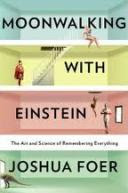"Instead of browsing the Web or walking around the block to cool my eyes, I'd pick up a list of random words and try to memorize it. Rather than take a magaine or book along with me on the subway, I'd whip out a page of random numbers. Did I understand, at the time, how weird I was becoming?"
I cannot spend 3 hours in an airport without buying a book--this was an Atlanta layover purchase.
Reminiscent of Mary Roach (see "Spook" and "Packing"), this is a popular science book on a specific topic - memory. As a freelance journalist specializing in scientific topics, Foer covered the U.S. Memory Championships and was surprised to find that instead of a group of savants, these mental athletes claim that anyone can learn their techniques and compete. With what he considered an average memory, Foer was skeptical, but he was won over to the challenge of it and decided to learn the methods with no thought other than to develop an interesting article. Thus began a year of research and mental workouts in the name of participatory journalism.
Roach's books center around a single subject, and regardless of the great humor in her writing, there is usually no story that ties the chapters together. Foer has a wry sense of humor derived from observation of absurd situations, but none of the blow-milk-out-your-nose LMAO moments I experienced while reading Roach. On the other hand, the "Moonwalking" has an overall story, his quest to become a mental athlete, interlaced with the history, philosophy and techniques of improving one's memory. Hence, I found his book more enjoyable than Roach's books.
I specifically enjoyed the historical, literary and scientific background on memory, how it has changed in importance from ancient times to the present, what purpose it served then and now, and why we are able to remember certain information, but not other. The chapter on the emphasis on memorization in education was particularly interesting and put a new light on what I already knew from the history of the educational system in the U.S.
Foer also introduces us to many people who have been studied for their memory, or lack thereof, ala Oliver Sacks. There is the man with no short term memory, who some characters of "50 First Dates" were modeled after, and if what this book has to say is true, then Drew Barrymore's character is more realistic than I first believed. Most interesting is a chapter that casts great doubts on Daniel Tammet's synesthesia and Asperger's Syndrome. I had listed to "Born on a Blue" day several years ago and am not ashamed to say that I took it all in. Foer points out inconsistencies with the story and shows us through his own example that the savant talents that Tammet displays can be reproduced by non-savants. I'm somewhat surprised that there is not more publicity about these inconsistencies as Tammet's books continue to sell well.
In "Moonwalking" we are introduced to the participants in the U.S. and international memory contest circuit, a particularly geeky crew. Foer is not afraid to embrace his inner geek, even if it means that to prepare for competition he spends time in his basement memorizing sheets of random digits wearing sound-proofing headphones and homemade blinder goggles and nothing else except his underwear. You'll have to read the book to find out how well he did in the U.S. memory championships. His journey is interesting and well worth the read.

No comments:
Post a Comment